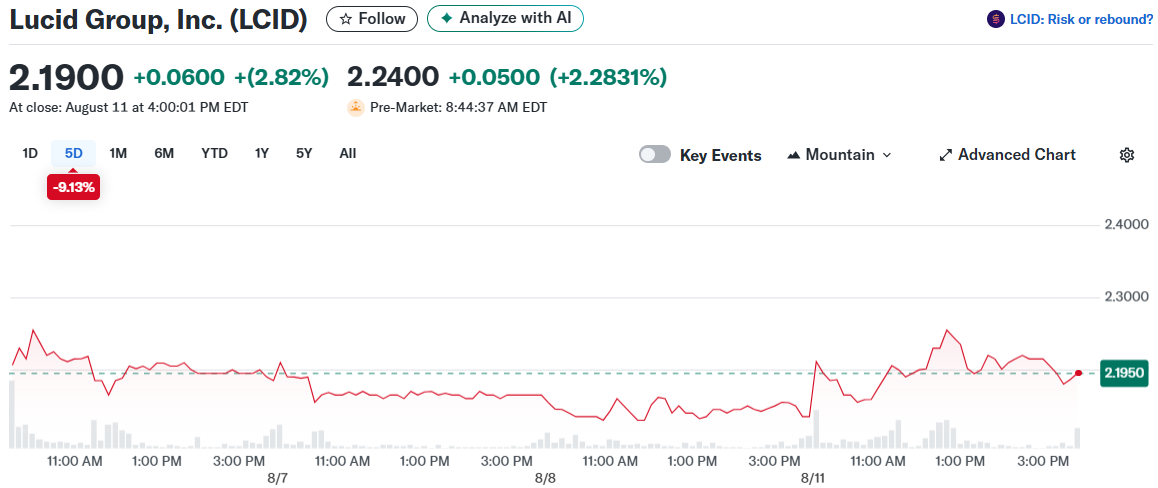TLDR
- Lucid Group (LCID) is down 30% in 2025 despite six consecutive quarters of record deliveries and a new Uber robotaxi partnership
- The company faces three major headwinds: loss of regulatory credit sales, elimination of $7,500 EV tax credit ending September 30, and tariff impacts on parts and materials
- Uber plans to deploy 20,000+ Lucid vehicles with Nuro’s autonomous driving technology over six years, starting with a major U.S. city launch next year
- Lucid produced 3,309 vehicles in Q2 2025 and is accelerating production of its new Gravity SUV in the second half of 2025
- Stock closed at $2.19, up 2.82%, with analyst price targets averaging $2.60 despite mostly neutral ratings
The electric vehicle maker’s stock tells a tale of two narratives this year. Strong operational progress meets harsh regulatory reality.
Lucid Group closed Tuesday at $2.19, gaining 2.82% in regular trading. The stock later climbed to $2.24 in after-hours action on volume of 116.5 million shares.

Despite this daily gain, shares remain down 30% for 2025. This creates a puzzle for investors watching the company’s improving fundamentals.
The EV maker just completed its sixth straight quarter of record deliveries. Q2 production reached 3,309 vehicles, marking substantial year-over-year growth.
Lucid is now ramping up production of its Gravity SUV. The company expects this new model to drive further delivery records in the second half of 2025.
The biggest catalyst came from an unexpected partnership announcement. Uber Technologies plans to invest hundreds of millions into Lucid for a robotaxi venture.
Robotaxi Partnership Changes the Game
This collaboration involves three companies: Uber, Lucid, and autonomous vehicle firm Nuro. The partnership targets deployment of over 20,000 Lucid vehicles equipped with Nuro’s self-driving technology.
The first robotaxi service will launch in a major U.S. city next year. A prototype is already operating on Nuro’s closed Las Vegas test track.
“This investment from Uber further validates Lucid’s fully redundant zonal architecture,” said Interim CEO Marc Winterhoff. He highlighted the company’s industry-leading range and spacious interiors as ideal for ridesharing.
Uber’s financial commitment adds credibility to Lucid’s autonomous vehicle capabilities. The partnership opens access to what Winterhoff calls a “multi-trillion-dollar market.”
The robotaxi news shifted attention away from traditional competitors like Tesla and Waymo. Instead, it positioned Lucid as a serious player in autonomous mobility.
Policy Changes Create Triple Headwind
Three regulatory shifts are weighing on Lucid’s stock performance this year. Each represents a direct hit to the company’s near-term prospects.
First, the elimination of regulatory credit penalties removed a key revenue source. EV makers previously sold credits to traditional automakers who needed to offset emissions from gasoline vehicles.
The current administration ended these penalties. This eliminated incentives for legacy automakers to purchase credits from companies like Lucid.
Second, the $7,500 federal EV tax credit expires on September 30. This policy change will make qualifying vehicles more expensive for consumers starting in Q4.
The credit’s end is expected to pull forward demand into Q3. This creates a potential sales lull in the fourth quarter as buyers rush to take advantage of the current incentive.
Third, tariffs on imported parts are squeezing automaker margins. Lucid imports components for assembly in the United States, but these still face tariff charges.
These trade policies also created bottlenecks in rare earth materials needed for battery production. Supply chain disruptions add costs and complexity to manufacturing operations.
Lucid’s Q2 sales are projected to rise nearly 38% year-over-year to $275.7 million. However, the company continues posting losses and relies heavily on funding from Saudi Arabia’s sovereign wealth fund.
The Saudi Public Investment Fund owns over 60% of Lucid. This backing provides financial stability but raises questions about long-term independence.
Wall Street analysts maintain mostly neutral ratings on the stock. Two analysts recommend selling while one suggests buying, with most holding “hold” ratings.
The average analyst price target sits at $2.60, above Tuesday’s closing price of $2.19. The stock has traded between $1.93 and $4.43 over the past 52 weeks.
Lucid’s market capitalization stands at approximately $6.73 billion. Daily trading volume averages around 148.2 million shares, creating liquidity for institutional investors.
The company opened its first manufacturing plant in Saudi Arabia in 2023 with capacity for 155,000 vehicles annually as part of Saudi Vision 2030.






